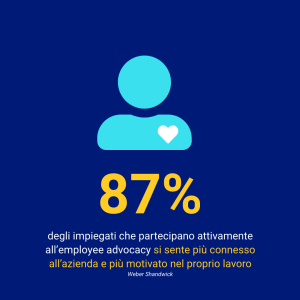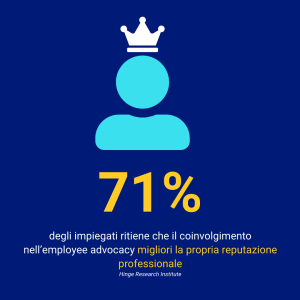Introduction
Welcome! In this article, we will explore the powerful concept of Employee Brand Advocacy and answer the fundamental question: ‘What is Employee Brand Advocacy?’ In an era where the reputation and image of a company are essential, understanding this strategy can provide a significant competitive advantage.
Definition of Employee Brand Advocacy
Employee Brand Advocacy is a strategic approach in which the employees of a company become the primary supporters and promoters of the brand they work for. In other words, they act as brand ambassadors both within and outside the company. These employees actively and passionately spread the message and values of the company within their professional network, especially on social platforms like LinkedIn.
Benefits of Employee Brand Advocacy
Employee Brand Advocacy offers numerous benefits to various areas of the company. Let’s see how it can positively impact Sales, Marketing, Internal Communication, and HR.
Benefits for the Sales Department
- Increase in sales: Employees who are Brand Advocates can positively influence potential customers, increasing the likelihood of closing sales.
- Increased Credibility: Recommendations from employees are often perceived as more authentic and credible compared to traditional advertisements.

Benefits for the Marketing Department
- Increase in Engagement: Employee Brand Advocates can share marketing content, increasing online engagement and brand visibility.
- User-Generated Content: Employees can create authentic content, such as reviews and personal stories, enriching the company’s content marketing strategy.

Benefits for the Internal Communication Department
- Employee Retention: Involving employees in Employee Brand Advocacy can enhance the sense of belonging to the company and trust in corporate decisions.
- Consistent Communication: When employees share the company’s vision and values, they contribute to a more cohesive and consistent internal communication.

Benefits for the HR (Human Resources) Department
- Attracting Top Talent: An company with a strong Employee Brand Advocacy presence is more appealing to job seekers, as it showcases a positive work environment.
- Turnover reduction: Employees involved in Employee Brand Advocacy often feel more connected to the company, thereby reducing staff turnover.
Conclusions
In conclusion, Employee Brand Advocacy is a powerful tool for building the reputation and success of a company. By involving employees as brand ambassadors, tangible benefits can be achieved in terms of sales, marketing, internal communication, and human resource management. Do not underestimate the potential of your collaborators in helping the company grow and thrive.
FAQ
1. What is the difference between Employee Brand Advocacy and Influencer Marketing?
The company’s employees participating in the Employee Brand Advocacy program do not receive financial compensation for doing so. These individuals simply share content related to their company with their network of contacts, making their message more authentic and credible. This is in stark contrast to external influencers who are specifically paid to positively promote the brand, and who may not always convey authenticity.
2. Can all employees become Brand Advocates?
No, not all employees will be natural Brand Advocates. Some may not feel comfortable or interested in participating actively.
3. What are some best practices for engaging employees in Employee Brand Advocacy?
Involving employees requires clear communication, proper training, and a positive work environment that encourages active engagement.
4. How to measure the effectiveness of an Employee Brand Advocacy program?
You can measure effectiveness through metrics such as social media engagement, web traffic generated by employees, and the lead conversion rate from their efforts.
5. What are some companies that have been successful with Employee Brand Advocacy?
In addition to Starbucks, companies like Microsoft, IBM, and Apple have successfully leveraged Employee Brand Advocacy to strengthen their online presence and brand reputation.
6. Is it necessary to use a dedicated platform to implement Employee Brand Advocacy?
While not strictly necessary, using a dedicated platform can significantly simplify the management and monitoring of Employee Brand Advocacy. A platform like Brand Booster provides advanced tools to engage, track, and support program activities. This allows for optimizing results and ensuring effective management of the Employee Brand Advocacy program. However, the choice to use a dedicated platform depends on the specific needs of your company.
